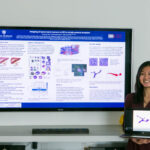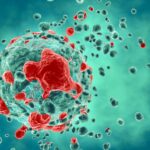EOC leader Gregg Semenza wins Canada Gairdner Award
Gregg Semenza, associate director of Johns Hopkins Engineering in Oncology Center (EOC), has been named among seven 2010 winners of Canada’s international prize for medical research–the Canada Gairdner Award. The award is among the most prestigious for medical research and comes with a $100,000 cash prize.
The Canada Gairdner Award recognized Semenza for his work on how cells respond to oxygen availability in the body. He was the first to identify and describe hypoxia-inducible factor-1 (HIF-1), which switches genes on or off in response to oxygen levels.
Semenza leads a research project related to this topic for EOC with Sharon Gerecht, an assistant professor of chemical and biomolecular engineering. Their work focuses on analyzing the makeup and physical properties of the extracellular matrix, the three-dimensional scaffold in which cells live.
“Normal cells live in a flexible scaffold, but cancer cells create a rigid scaffold that they climb through to invade normal tissue,” Semenza said. “We will study how this change occurs and how it is affected by the amount of oxygen to which cancer cells are exposed. Our studies have shown that cancer cells are deprived of oxygen, which incites them to more aggressively invade the surrounding normal tissues where oxygen is more plentiful. Hypoxia-inducible factor 1 controls the responses of cancer cells to low oxygen, and we have recently identified drugs that block the action of HIF-1 and inhibit tumor growth in experimental cancer models.”
Semenza is the C. Michael Armstrong Professor in Medicine and founding director of the Vascular Biology program at Johns Hopkins Institute for Cell Engineering at the School of Medicine. He also is a member of the McKusick-Nathans Institute of Genetic Medicine, is an affiliated faculty member of Johns Hopkins Institute for NanoBioTechnology, and has ties to the Department of Biological Chemistry and the Sidney Kimmel Comprehensive Cancer Center, both at the Johns Hopkins School of Medicine.
The Johns Hopkins Engineering in Oncology Center, launched October 2009, is one of 12 funded by the National Cancer Institute to bring a new cadre of theoretical physicists, mathematicians, chemists and engineers to the study of cancer. During the five-year initiative, the NCI’s Physical Sciences-Oncology Centers (PS-OC) will take new, nontraditional approaches to cancer research by studying the physical laws and principles of cancer; evolution and evolutionary theory of cancer; information coding, decoding, transfer and translation in cancer; and ways to deconvolute cancer’s complexity.
Read more about Gregg Semenza winning the Canada Gairdner Award in the Johns Hopkins Gazette story by Audrey Huang here.
Latest Posts
-
 Q&A with PSON Intern Jocelyn Hsu
August 19, 2021
Q&A with PSON Intern Jocelyn Hsu
August 19, 2021
-
 Start Up Founders from Johns Hopkins Aim to Stop Spread of Cancer
August 3, 2021
Start Up Founders from Johns Hopkins Aim to Stop Spread of Cancer
August 3, 2021
-
 Protein Appears to Prevent Tumor Cells from Spreading Via Blood Vessels
July 15, 2021
Protein Appears to Prevent Tumor Cells from Spreading Via Blood Vessels
July 15, 2021


